I was invited to give a talk on the Church and undocumented immigrants this week at my alma mater, Franciscan University of Steubenville. The talk was sponsored by Latinos for Christ, a student organization I helped start at the college in 2003. It was a blessing to return seven years after graduation. Below is the text of my talk.
I am grateful for the invitation to share with you some of my experiences and insights about immigration, especially about the estimated 12 million undocumented immigrants present in the United States at this moment. By the end of tonight I hope you better grasp the hardships faced by these undocumented immigrants along with their families and communities, and better understand why the church has an important voice in the current immigration discussion in our country.
Imagine you are fifteen years old and you are a legal citizen of the country where you were born and where you live, with all the rights and responsibilities of a citizen; yet you live with one constant fear: one day you will come home from school and your parents will be gone (deported) and you will be left with your five younger siblings. Unless legal arrangements were made before, the state will then take you and your siblings and place you in foster care.
Imagine you were brought into a country by your parents when you were one month old. Now you are twenty and the only country you know deports you to your parent’s country. You do not know the language, you do not understand the culture. You are deported to an unknown and unfamiliar place and barred from your true home, where you have lived all your life, yet you will have to wait ten years before you can see if you somehow qualify to go back home legally.
Sounds pretty bad? But the country where these scenarios unfold daily is the United States of America. These two young people were my parishioners, right here, right now, in the country that until the 1920s welcomed anyone (except the Chinese) who arrived at its shore. Back then the welcoming inscription of the Statue of Liberty was true, “Give me your tired, your poor / Your huddled masses yearning to breathe free.” Since the 1920s and even more so since the 1960s, this inscription has become hard to believe.
For the past three and a half years I’ve been working with immigrants in southern Georgia, most of them come from Mexico, about half of them are here without proper documentation. Some enter the country legally and overstay their visas, others make the dangerous crossing through the desert or the river led by a “coyote,” paying at times thousands of dollars and leaving them with a traumatizing experience of which only two people have spoken to me about.
I had a very faithful parishioner say to me once, “Father, the church should not minister to illegals, you are condoning their behavior by ministering to them.”
I looked at this very concerned parishioner and calmly said, “Twice a month I celebrate Mass and hear confessions at the state prison. I go because there are Catholics in need of being ministered. I make no statement whatsoever regarding their past. I do not care if they murdered, dealt drugs or stole. I am there because at the prison there are human beings in need of Christ, in need of redemption and in need of hearing the Gospel.”
This gets to the heart of the immigration issue. The Church does not advocate nor favor undocumented immigration, the Church does not want the border with Mexico to be opened and allow everyone to come in, but the Church advocates the respectful treatment of immigrants, even if undocumented, because every soul, including the soul of an undocumented immigrant, has infinite value and dignity.
As Archbishop Gomez stated last year at a Knights of Columbus convention, “The Church’s perspective on immigration issues is rooted in Jesus Christ’s teaching that every human person is created in God’s image and has God-given dignity and rights.”
The Church speaks for the vulnerable and the weak. Jesus tells us that our love for God will be judged by our love for him in the person of the least among us, this includes, he said, the immigrant or the stranger.
Our human dignity is not given to us by a government, a visa or a green card. Our dignity is given to us by God. Documented or undocumented, the Church has a responsibility to protect human dignity and most especially when the majority of the undocumented in the United States right now are faithful members of the church, they are Catholics.
Last year for the Feast of Our Lady of Guadalupe the US Latino Bishops issued a beautiful letter addressed to all Latino immigrants of the country.
“We recognize that every human being, authorized or not, is an image of God and therefore possesses infinite value and dignity,” they wrote. The bishops rightly recognized the sacrifices done by immigrants for the well-being of their families, their perseverance and determination despite their insecurities and difficulties.
They continued, “despite their contributions to American society, instead of receiving thanks, they are often treated as criminals because they’ve violated current immigration laws.”
Once as I heard someone on the radio state how immigrants in general offer NOTHING to the United States I watched an enormous crew of Latino construction workers lay bricks at the new Columbia County Government Complex (where I grew up). I looked at myself on the mirror wearing my clerics. We offer nothing at all, yes indeed, nothing at all to this country with which I identify more than the country of my birth – Peru.
The bishops recognized the pain suffered from the deportation of family members, the separation of families, the frustration of youth. In Veritatis Splendor #80, John Paul II cites Gaudium et Spes calling deportation an intrinsic evil because it does violence to the dignity of the human person.
The bishops call for a change in our immigration laws and for legislation that respects family unity and provides an orderly and reasonable process for unauthorized persons to attain citizenship.
In the meantime, the church must offer spiritual nourishment to the undocumented regardless of what the law may state so that immigrants will not despair. In 2006 there was a fear that a new California law would require religious institutions to ask for legal documentation of those assisted, Cardinal Mahoney of Los Angeles told his priests they would have to disobey that law. More recently in Alabama, one year ago exactly, the two Catholic bishops sued the state because the new immigration law put in jeopardy priests who offered the sacraments or any other religious service to undocumented immigrants. The Church serves the people of God regardless of legal status.
The church does not care if a person is documented or not, the church cares that the person has an immortal soul that must be taken care of. The church’s position on immigration is non-partisan, it is non-political. It is entirely based on the recognition of the dignity of the human person.
An old Mexican lady once said to me, “Father, I am not wanted here, but if I return to Mexico, I would be killed. I am not wanted here nor there. When will I find a place where I am wanted?”
I hope to have painted by now an emotional picture of the plight of many undocumented immigrants. They do not have it easy, it is a difficult life full of anxiety and distress, yet the life they left behind is even less desirable.
These immigrants do not mooch off from the welfare state, they pay sales taxes, they pay property taxes (if they rent or own a property) and they have taxes withheld from their paychecks which they then never have access to since they do not file taxes. This unclaimed stash of money from social security numbers that do not match the name of the person grows by 55 billion dollars each year.
The million dollar question is “Why do not they come here legally?” Many naively state, “My ancestors came here legally, these people must go back, get in line and come in legally.”
Why don’t they come here legally? The USCCB has issued an statement answering this question and the answer is extremely simple: there are no legal paths for most immigrants to enter the United States.
Currently one can immigrate legally into the Untied States only under three conditions:
1. A family member who is a US citizen petitions you.
2. You are fleeing political persecution and there is fear you may be killed.
3. You are a high-skilled worker and a US company sponsors you.
The problem here is that most unauthorized immigrants are low-skilled workers who come to maintain their families. They work in agricultural, meatpacking, landscaping, construction industries and do not qualify. An estimated 300,000 undocumented low-skilled workers enter the United States yearly and the US government officially makes available only 5,000 work permits for low-skilled workers. Do the math, 295,000 pepole would be left waiting every year. Temporary work visas exist (66,000 per year), but US companies shy away from them because the red tape is tremendous and the expenses high.
Entry into the United States became more difficult in the 1960s, even more so in the 90s and very difficult after 2001. To state immigrants should come as immigrants came one hundred years ago is like asking Saint Peter to show you his iphone: creatures of two completely different eras.
Archbishop Gomez stated last year at the Knighs of Columbus convention, “America has always been a nation of justice and law. But as Americans we have also always been a people of generosity, mercy and forgiveness. Unfortunately, our nations’ current response to illegal immigration is not worthy of our national character.
I have been a first-hand witness of this. Listen to these words addressed to me on the Macon Telegraph after my picture appeared on the front page after I led a prayer at a gathering of immigrants calling for immigration reform:
Why doesn’t Father Pablo Migone go to Mexico if he wants a Mexican Parish?
Also, why doesn’t he protest in Mexico about the fact that Mexico doesn’t allow foreign Religious pastors or Catholic missionaries to come to minister in Mexico, yet Father Migone is content to come from Mexico to the U.S. to minister to His flock.
{Funny thing is, I’m not even from Mexico, I was born in Lima, Peru. From what I know, at the present moment Mexico does allow Catholic missionaries to minister in Mexico}
If priests would spend more time preaching the Gospels and the Doctrines of the Church and less time with their left-wing, post-Vatican II liberation theology the [Roman Catholic] Church might not have all the problems it is experiencing these days. Pablo Migone is aiding and abetting these illegals and should be arrested along with the rest of them.
{Thankfully law enforcement did not heed this person’s idea and I am here today to share my thoughts with you. Sad to admit, the person who wrote this comment is probably a practicing Catholic}
Migone….Please tell me how you have dignity when you are breaking the laws of the USA.
{When did breaking a law do away with our human dignity?}
Breaking the law does not do away with your dignity. Our dignity is freely given to us by God and it cannot be taken away despite our sinfulness.
We live in a point in time where much misunderstanding exists regarding immigration. The Catholic Church believes that the current immigration laws must be reformed to meet our country’s need for low-skilled labor and facilitate the reunification of families. I hope my words tonight have helped you understand the role the Church plays in the immigration dialogue as the champion of human dignity, as the voice for the voiceless and the hope for the foreigner and immigrant.
Recommended reading:
Pastoral Letter of Bishop of Arkansas
Letter of the Hispanic/Latino Bishops to immigrants
Archbishop Gomez on Immigration
Archbishop Aquila on Immigration
Pastoral Statement of the Catholic Bishops of Georgia
















